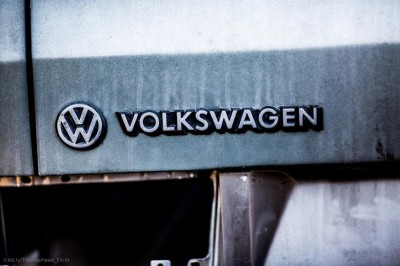DieselGate: EU Commission Attempts to Delay Policing of Diesel Emissions. “VW Was Caught Cheating”

In September last year, car manufacturer Volkswagen was caught cheating on emission tests in the US – the ‘Dieselgate’ scandal was unleashed and quickly went on to also hit Europe. Like in the US, VW diesel cars manufactured in the EU were found to contain cheat devices which under lab conditions would throttle the emission of harmful nitrogen oxides, pollutants which in 2015 caused an estimated 75,000 premature deaths in Europe alone.
As the investigation into the Dieselgate affair deepens both in VW’s home country Germany as well as at EU-level, the European Commission’s role in the scandal comes into focus. Corporate Europe Observatory recently obtained leaked documents (I, II, III, IV) which reveal the illegal attempt of the Commission’s enterprise department (DG Enterprise) to delay enforcement of EU emissions standards for diesel cars in a bid to help industry save money.
A five-year lead-in period for the tougher new tests was thus suggested in order to spare manufacturers the costs of technological adaptation necessitated by more accurate emission readings.iii Ignoring the 2007 EU regulation that obliges auto manufacturers to cut toxic nitrogen oxide emissions, DG Enterprise even claimed that “as a consequence [of the economic crisis] it may not be political[ly] opportune to implement RDE measures […] during the next couple of years“.iv Once informed of the plans by DG Enterprise, DG Environment strongly objected to the strategy, emphasising the legal obligation of enforcing EU emissions standards, and warning that the proposed delay would violate EU pollution regulation.v To DG Environment staff, a five-year timeline was indefensible vi, and the pretext of the financial crisis “[could not] be adduced in the continued failure [to] properly implement the […] legislation“.vii
Even member states themselves rejected the DG Environment proposal, given “the importance […] of air quality […] problems caused across the EU by the real-world emissions of diesel“ viii While they agreed to consider a delayed enforcement of diesel standards, they, too, rejected the suggestion of keeping dirty diesel cars on sale even if they failed the new tests.ix
Although there is no direct link between this 2012 attempt of DG Enterprise to delay the enforcement in member states and last year’s EU decision on when and how to introduce the new RDE tests, its intention is very much reflected here: they will only be used as of autumn 2017, with test results of diesel emissions being allowed to exceed the legal limit for nitrogen oxides by up to 210% until 2020 and by up to 50% ever after.
Understandably, Tajani as European Commissioner in charge of car industry regulation at the time, had to appear before the ‘EMIS’ dieselgate inquiry committee of the EU Parliament regarding his role in the scandal and the Commission’s apparent lack of political will to push for a timely enforcement in emission standards . Tajani insisted that his call for a regulatory moratorium in 2012 had no ”indirect impact on the DG […] that could have led […] to a slowing down of the legislative activity.“x
The leaked correspondence clearly rebuts this claim and exposes how reluctant a key department of the European Commission has been to tackle the problem of diesel cars exceeding EU emission standards – to the detriment of public health and the environment.
Notes:
iEnterprise and Industry Directorate General: Real Driving Emissions of Light Duty Vehicles: Meeting with Member States of 3 May 2012. ENTR.F1/KS D(2012). European Commission, Brussels, 18 April 2012.
iiEnterprise and Industry Directorate General: Real Driving Emissions of Light Duty Vehicles: Meeting with Member States of 3 May 2012. ENTR.F1/KS D(2012). European Commission, Brussels, 18 April 2012.
iiiEnterprise and Industry Directorate General: Note for the Attention of K. Falkenberg, Director-General, DG Environment. ENTR/D/5/KS/iv -(2012)8426883. European Commission, Brussels, 25 June 2012.
ivEnterprise and Industry Directorate General: Real Driving Emissions of Light Duty Vehicles: Meeting with Member States of 3 May 2012. ENTR.F1/KS D(2012). European Commission, Brussels, 18 April 2012.
vDirectorate-General Environment: Note for the Attention of Mr Daniel Calleja Crespo, Director General, Enterprise and Industry. ENV/C3/SB/pb ARES(2012). European Commission, Brussels, 27 April 2012.
viDirectorate-General Environment: Note for the Attention of Mr Daniel Calleja Crespo, Director General, Enterprise and Industry. ENV/C3/SB/pb ARES(2012). European Commission, Brussels, 27 April 2012.
viiDirectorate-General Environment: Note for the Attention of Mr Daniel Calleja Crespo, Director General, Enterprise and Industry. ENV/C3/SB/pb ARES(2012). European Commission, Brussels, 27 April 2012.
viiiDG Enterprise and Industry Directorate-General: RDE-LDV workshop of Member States of 3 May 2012: executive summary. ENTR.F1/KA D(2012). Brussels, 01 June 2012.
ixDG Enterprise and Industry Directorate-General: RDE-LDV workshop of Member States of 3 May 2012: executive summary. ENTR.F1/KA D(2012). Brussels, 01 June 2012.
xTable with questions to Mr. Antonio Tajani – EMIS hearing of 5/9/2016, Question 12, p. 12. Accessible under http://www.emeeting.europarl.europa.eu/committees/agenda/201609/EMIS/EMIS(2016)0905_1/sitt-3169787

